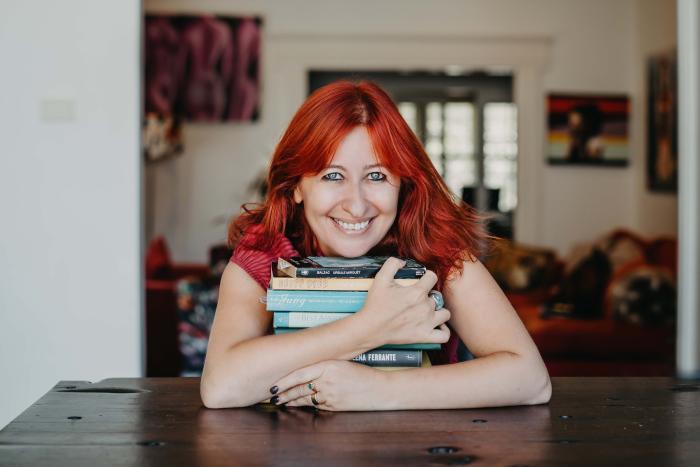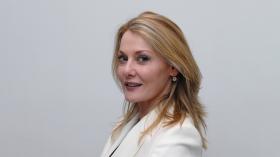Until I turned 13 and my hormones kicked in, and I discovered boys and such libidinal ambitions as art, my wettest dream for my adult future was to become a librarian.
The roots of that dream were planted in the soil of Odessa — then a part of the Soviet empire — where I spent my childhood. Like everywhere in the Soviet Union, Odessa’s residential buildings were old and crumbly to the point of danger, or new and grey-rectangular ugly. Public spaces, however, were palatial, to gaslight the citizens into believing that, as our ubiquitous placards said, we were living in paradise on earth. My local library was no different. High ceilings, polished parquet floors, a chandelier or two. I’d go to the nearby clinic to receive injections or do check-ups — I was a sickly child, afflicted by more conditions than is feasible to describe here. Afterwards, as a treat, I would stay in the library for hours, often instead of going to school.
The library’s ordered, serene glamour, with its self- contained patrons deep in books, and librarians quietly hovering around like fairy godmothers, stood in stark contrast to my chaotic homelife. There my baby brothers screamed, KGB officers lurked around surveilling my parents’ dissident activities, and the daily stresses of poverty abounded. The library — unlike my home or school, where children were fond of calling me ‘dirty Jew’ — was my city of refuge.
I walked its exotic streets, living alternate lives. I was a milady in a lice-ridden pretty wig, partaking in court intrigues as recounted by Alexandre Dumas. I was a wolf roaming the Canadian wilderness, courtesy of Jack London. I was whoever I wished to be but not a frail, timid, Jewish kid.
My choices for escape were abundant in a country where books were a natural habitat of the mind in the absence of other entertainment, and on account of their state- driven affordability. In the Soviet Union, even truck drivers habitually referred to Tolstoy. (I actually preferred their references to those of my teachers, who often divorced the texts from irony and stripped them down to bare Tolstoyan moralism.) However, the Soviet Union popularised books selectively — Tolstoy and Australia’s own communist Katharine Susannah Prichard were in; George Orwell and Solzhenitsyn were banned. Much of the available literature was state- sponsored propaganda. The library’s children’s section was overridden with tales about Lenin as a child or adult; no matter his age, on the page the halo of sainthood hovered above him. And there were various versions of the defining Soviet children’s story, that of another saint, Pavlik Morozov. Pavlik attained sacred status at the dawn of the revolution by dobbing in his kulak (wealthy peasant) father to the Red Army for hiding some wheat to avoid its confiscation. The father got shot. The son got canonised. Young readers were served his story endlessly — as an exemplary tale.
But I, the child of dissidents, who refused to join the ranks of pioneers at my school (this surely didn’t help my non-existent popularity), brought a critical eye to the library’s shelves. Plus, I had some privileges. To get more time away from school and home, I began volunteering in the library. I spent days breathing in the papery aroma of returned books while restoring them to their rightful places — the only tikkun (a correction of the world, in Judaism) that I felt I was able to make. In return, I could borrow as many books as I liked, including from the adult sections. It was there that the world opened up for me — Dumas, the humanism of Chekhov, naughty, sensual Guy de Maupassant … I was learning to think for myself. And to dare.
My existence became so enmeshed with written words that it felt only natural to eventually start jotting down my own stories too. Just like the library, just like reading, writing afforded me an alternative space in which to fulfil my wishes for a freer, brighter life. But in my younger years I was still too shy to think of myself as a writer, so instead I dreamt of becoming a librarian.
In later years, after I turned teenager and my family was finally permitted to migrate to Israel, even after the hormones shook me upside down, I continued to visit libraries. But the brighter the lipsticks I now used became, the more my love affair with libraries paled. The fondness remained, but not the intensity of need. My dream was now to be a writer. And yet this dream, and its eventual realisation, might not have happened without those classics I once devoured in the grandeur of Odessa’s library. Those books must be shimmering somewhere in the depths of my subconscious, like chandeliers. Because whatever I write, I am still discoursing with Chekhov. Whatever I write, I am still wearing a lice-ridden pretty wig.

Lee Kofman is a Melbourne-based author, writing mentor and teacher. Her books include The Writer Laid Bare (2022), Imperfect (2019) and The Dangerous Bride (2014).
This story appears in Openbook autumn 2024.




